
QuickGuide to Speedlite 600EX-RT
Radio Wireless Flash Setup
INTRODUCTION
The Speedlite 600EX-RT allows you to set up multiple Speedlites
as “slaves” which are wirelessly controlled and synchronized by a
“master” unit. As compared to flash units that use optical signals
only, the 600EX-RT’s radio-based wireless E-TTL offers signifi-
cant advantages, such as the freedom to place 600EX-RT slave
units up to 98 feet from the camera and “master unit”, all without a
direct line-of-sight between the master and slaves. Your wireless
radio setup options include:
•
Automatic E-TTL
with
equal
output from all units
•
Automatic Ratio E-TTL
with
unequal
(ratio) output
between firing groups
•
M
– Manually-set power output (you can set a different
flash output for each slave unit or firing group)
•
GR
– Different groups have different flash modes, with
up to five groups
Only a 600EX-RT or ST-E3-RT Speedlite Transmitter attached to
a camera can be a master. You can, however, use two or more
master units by setting up multiple cameras, each with a master
unit attached, and switch from one to another during a wireless
flash shooting session. The slave lighting setup will remain the
same. Only 600EX-RTs can be slaves when you are shooting in
radio control mode.
COMPATIBILITY
EOS cameras released since
2012
(such as EOS-1D X, EOS 5D
Mark III, EOS 6D, and EOS Rebel T4i) – full compatibility
EOS cameras released before 2012:
•
Flash sync speed must be one stop slower than the
maximum
•
No high-speed sync shooting
•
No group (GR mode) flash
Note:
Full flash sync, including Hi-Speed Sync, is available with
the 600EX-RT with all EOS SLRs when used in optical wireless
E-TTL control mode.
INITIAL WIRELESS RADIO FLASH SETUP
You must first set the master and slaves to matching transmission
channels and wireless radio IDs. Once you have done so, any
settings you make to the master will automatically be transmit-
ted to the slaves. This eliminates the need to adjust the slaves
individually and manually.
1.
To set the master unit:
Press the
Wireless Flash Button
until
the RT icon (upper-right corner of the unit’s LCD screen) and
<MASTER>
appear.
The wireless flash cycle via button is: Conventional on-camera
flash > Radio-based Master unit > Radio-based Slave unit >
Optical-based Master unit > Optical based Slave unit.
2.
To set the slave unit(s):
Press the
Wireless Flash Button
until
the RT icon and
<SLAVE>
appear.
3.
To set the transmission channel:
Set the master and slave
units to the same Transmission Channel, otherwise the
slave(s) will not fire. Use the same procedure below for
master and slave.
a. Press
Fn Button 4
until
<MENU 3>
displays.
b. Press the channel button (
Fn Button 1
, under the “CH”
icon). The channel number will highlight immediately
below RT icon. Turn the selector dial to the channel
number of your choice (1 to 15) or AUTO. If you set
AUTO, the 600EX-RT will automatically set the channel
with the best reception. Set the master and slave units
to the same Wireless Radio Channel.
c.
Press
Fn Button 4
until
<MENU 3>
displays.
d. Press
Fn Button 2
to highlight ID.
e. Turn the
Select Dial
to the digit you want to set. There
are four digits.
f.
Press the
Select/Set Button
to activate the digit setting.
g. Turn the
Select Dial
to set any digit from 0 to 9, then
press the
Select/Set Button
to register your setting.
h. Repeat steps e – g to enter a four-digit number. You
can enter any number from 0000 – 9999. The master
and slave units must be set to same ID number. The
number you set must be different from that of any other
600EX-RT shooter in the vicinity.
i.
Press
Fn Button 4
to return the flash to shoot-ready
mode.
j.
The
<LINK>
lamp should light green to indicate a
working link between the master and slave, assuming
both are turned on and set to same Channel/ID.
•
If you are using more than one master, the color of the
<LINK>
lamp will vary depending on the order in which
you turn the masters on. The first/main master is green.
Subsequent/sub-masters are orange.
•
If the LINK lamp is continuously red, check to make
sure the master and slave are set to the same channel
and ID.
•
If the LINK lamp is blinking red, either your setup totals
more than 16 units or you may need to turn the power
off and on again.
MASTER FLASH FIRING ON/OFF
You can choose whether master flash firing is ON and therefore
the master contributes to the flash exposure, or OFF and does
not. The master flash will still control the slaves, regardless of
whether it contributes to the exposure.
1. Press
Fn Button 4
until Menu 2 displays.
2. Press
Fn Button 1
(under Flash On/Off icon) to ON or OFF
a. Three little beam lines coming from flash icon on LCD
panel indicate Master Flash ON
b. Beam icons disappear when Master Flash OFF
is active
WIRELESS E-TTL — “ALL” (FLASH RATIO OFF)
In this mode all flash units will fire at the same output, with full
E-TTL auto flash exposure, which you can adjust with flash
exposure compensation (FEC) on your camera, as necessary.
This mode is best for lighting setups where you want even lighting
throughout the scene. E-TTL is also great when flash-to-subject
distances may change from shot to shot.
1.
Perform the initial flash setup described above.
Confirm that
master and slave are set to the same transmission channel
and radio ID. Position the camera and flash within correct
operating range (30 meters/98 feet.)
2.
Set the firing group on each slave unit.
Set the slave unit to
firing group A, B, or C. The slave will not fire if set to group D
or E, when ratio control is set to ALL. You can assign multiple
flash units to the same group.
3.
Set the master to radio-based Wireless E-TTL.
Press the
<MODE>
button on the master unit to set the master to
E-TTL.
4.
Set the Ratio to “ALL”
— On master unit, press
Fn Button 4
(under “Menu 1” icon) until Menu 2 appears.
Press Fn
Button 2
(under “Ratio” icon) until “ALL”
appears on master unit’s LCD panel.
5.
Confirm wireless link.
Confirm that the
<LINK>
lights on the
600EX-RT’s are lit and green and that the AF-assist beam
emitter on the slave is blinking at 1-second intervals. Also
confirm that the red flash ready light is lit on the master unit.
6.
Shoot.
a. Press the test flash button on the master flash to check
operation. If a slave does not fire, make sure it is within
the correct range.
b. Take the picture. The flash exposure confirmation
lamp will light for 3 secs to confirm normal exposure.
1
2
3
Fn Button 1
Wireless
Button
Flash Ready/Test Flash
Flash Mode Button
Fn Button 2
Fn Button 3
Fn Button 4
Select Dial


